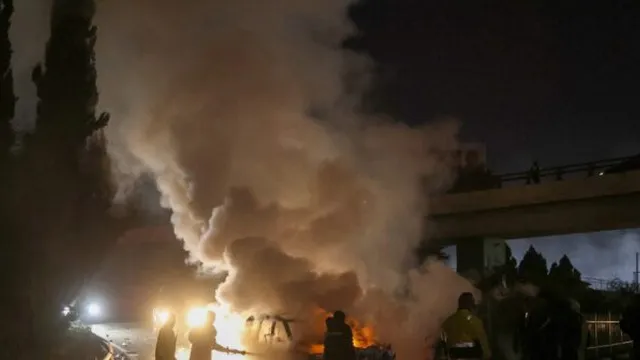
Protesters injure UN peacekeeping commander in Lebanon
2025-02-15 21:55- Maj. Gen. Chok Bahadur Dhakal was injured when protesters attacked a UNIFIL convoy in Lebanon.
- The protests were sparked by the cancellation of an Iranian passenger flight, which left many Lebanese stranded.
- The Lebanese army responded and promised to bring the attackers to justice, highlighting ongoing tensions in the region.
Express your sentiment!
Insights
In Lebanon, the outgoing deputy commander of the United Nations peacekeeping force, Maj. Gen. Chok Bahadur Dhakal from Nepal, suffered injuries during a protest on February 14, 2025. The incident occurred as a UNIFIL convoy was en route to the Beirut airport when protesters blocked the road to voice their discontent over the Lebanese authorities' decision to cancel a flight from Iran. This decision left many Lebanese passengers stranded, intensifying frustrations regarding security and political conditions in the country. The protest was sparked by allegations from the Israeli army that Iran was using civilian flights to channel money to Hezbollah, which heightened tensions among the Lebanese population regarding perceived interference from Israel. The demonstrators, dissatisfied with the government's actions in the face of external pressure, responded with hostility, leading to the violent confrontation. In response to the attack, the Lebanese army intervened and later stated that they would pursue those responsible, promising to bring them to justice. This commitment reflects the ongoing struggle within Lebanon to maintain security amid protests and civil unrest that have periodically erupted in the past few years over various political and economic issues. The incident underscores the fragile situation in Lebanon, especially regarding the UN's long-term presence in the region to maintain peace following the tumultuous history between Israel and Hezbollah. The UNIFIL mission, created after Israel's 1978 invasion, has faced accusations from both Hezbollah supporters and Israeli officials, contributing to the complexity of their position in the region. As the Lebanese military works to assert control over the southern region, there are continued calls for increased support and a re-evaluation of the presence of foreign forces in Lebanon.
Contexts
Lebanon has experienced a complex history of protests against foreign interference, rooted in a long-standing struggle for national sovereignty and identity. The legacy of foreign involvement in Lebanon's internal affairs dates back to the Ottoman Empire and was compounded by the French Mandate in the early 20th century, which significantly shaped the country's political landscape. The subsequent civil war from 1975 to 1990 further exacerbated the situation, with various factions supported by foreign powers, including Syria, Israel, and Iran. This proxy nature of conflicts created deep divisions within Lebanese society and led to a growing mistrust of external influence, which has persisted into the present day. The aftermath of the civil war also saw Syrian troops maintaining a significant presence in Lebanon, fueling protests that demanded their withdrawal and an end to foreign dominance over Lebanese politics. In 2005, the assassination of former Prime Minister Rafik Hariri sparked widespread protests known as the Cedar Revolution, which mobilized a diverse coalition of Lebanese citizens against Syrian control. This movement highlighted the population's desire for greater autonomy and influenced the eventual withdrawal of Syrian troops from Lebanon. Following this landmark moment, Lebanon saw a series of protests aimed at countering foreign influence and asserting national independence, each reflecting the populace's increasing awareness of the importance of sovereignty in a changing geopolitical landscape. However, despite the withdrawal of Syrian forces, political instability remained prevalent, with other foreign powers continuing to vie for influence within Lebanon, particularly through sectarian alliances and partisan support. In recent years, anti-government protests, notably in late 2019, have explicitly articulated discontent with foreign interference, particularly the alleged control of Hezbollah, a group supported by Iran. These protests have called for fundamental changes in the political structure, including the establishment of a system free from foreign influence. Participants condemned the pervasive corruption and economic mismanagement that they associated with external powers manipulating local actors for their own interests. Activists and civil society groups have consistently emphasized the need for a truly sovereign Lebanon that prioritizes the welfare of its citizens over sectarian and foreign agendas. As Lebanon navigates its path forward, the struggle against foreign interference remains vital to the aspirations of many citizens. Recent protests demonstrate a growing recognition that any meaningful reform must tackle the detrimental impact of external actors on the country’s governance and social fabric. The resilience of the Lebanese people in advocating for their rights and freedoms continues to define the narrative surrounding protests in Lebanon, as they remain committed to shaping a future where national identity and self-determination prevail over external manipulation.